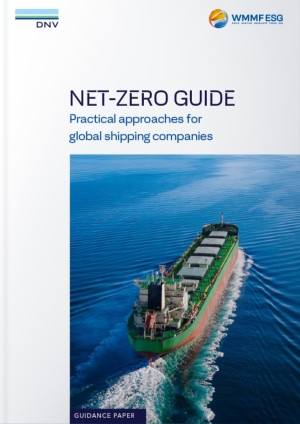


(Posted on 24/11/25)
The maritime industry is experiencing a period of significant transformation, driven by rapidly evolving regulations, increasing commercial pressure, and a global shift towards reducing greenhouse gas (GHG) emissions. In response, DNV and the World Maritime Merchants Forum (WMMF) ESG team have published a new guide to help shipowners navigate these evolving challenges, an effort supported by industry organisations in Hong Kong and worldwide.
The "Net-Zero Guide: Practical Approaches for Global Shipping Companies" provides a structured roadmap for advancing decarbonization. Drawing on data-driven insights and real-world operator experience, the guide offers actionable steps for shipowners to align operational and investment decisions with both international and regional regulations. It also helps companies navigate uncertainties, adopt best practices, and take pragmatic actions that prepare them for future changes in a rapidly evolving landscape.
Knut Ørbeck-Nilssen, CEO, DNV Maritime said: “Shipping’s decarbonisation journey continues despite the postponement at the IMO. The reality is that energy efficiency and fuel flexibility or readiness are still considered and implemented on vessels. Continuing on this course will maintain competitiveness and contribute to the sector’s long-term decarbonization goals. The collaboration with World Maritime Merchants Forum (WMMF) on this guide is itself a testament to the importance of working together to pave the way for successful decarbonization.”
Mr. Wang Yong Xin, the?President of China Merchants Energy Shipping (CMES) said: “The Net-Zero Guide offers the industry a wealth of practical reference cases in a complex transition environment, helping shipping companies strike a balance between short-term operations and long-term emissions reduction.”
The guide addresses the increasing complexity and cost of compliance, especially for small and medium enterprises (SMEs), and outlines procedures to manage costs while supporting the transition of fleets toward net-zero emissions. It also sets out cost-effective actions, such as energy-efficiency upgrades, phased fuel transitions, and targeted fleet renewal or retrofits, to control expenses and avoid stranded assets. By aligning investments with operational improvements and market expectations, shipowners can strengthen their commercial resilience and position themselves for long-term success.
Shipowners are also urged to embed decarbonization into their core business strategies. This includes linking compliance with fleet investment and financing, while adopting a lifecycle approach to fleet management that balances renewal, retrofits, and operational optimization. Structured competence development and robust change management are essential to building organizational capability and supporting sustainable growth. By leveraging partnerships across the value chain and investing in digitalization and data governance, companies can enhance transparency, ensure regulatory compliance, and unlock long-term efficiencies.
NorthStandard has advised Members of a 5% increase in P&I premiums for the marine insurance year... Read more
Anemoi Marine Technologies, the UK-based leading designer of Rotor Sails for wind-assisted ship propulsion... Read more
Helm Operations has announced that nine electronic record books within Helm CONNECT Logbook have been... Read more
International maritime welfare charity Sailors’ Society has announced a significant expansion... Read more
NORDEN has signed a two-year Contract of Affreightment (COA) with Enviva to transport a significant... Read more
Algoma Central Corporation has reported its results for the three and nine months ended 30 September... Read more
Damen Shipyards Group has unveiled the latest platform in its successful cargo vessels portfolio. The... Read more
Wallem Group, a leading global maritime partner, is celebrating the centenary of moving its headquarters... Read more
The International Association of Dry Cargo Shipowners (INTERCARGO) is marking its 45th anniversary in... Read more
Net profit for the Group amounted to USD 26 million (DKK 166 million) in the third quarter of 2025,... Read more